Teachers In Iran Protest For Higher Pay Amid Crippling Inflation
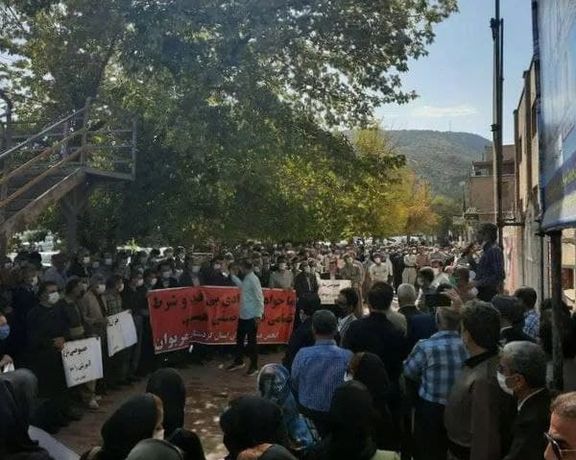
Teachers in Iran held protest rallies in several cities to demand the passage of legislation that would guarantee higher pay amid skyrocketing inflation.

Teachers in Iran held protest rallies in several cities to demand the passage of legislation that would guarantee higher pay amid skyrocketing inflation.
Responding to calls by teachers’ groups, protesters congregated outside the office of the education ministry in many cities and also outside the headquarters of the Planning and Budget Organization in Tehran on Thursday.
Parliament has failed so far to give its final seal of approval to a bill which would create a pay scale for teachers commensurate with the pay scale of university professors, guaranteeing up to 80 percent of the same salary grade.
Lawmakers have hesitated because there is no budget if a pay raise goes into effect. This year’s government budget has between 30-50 percent deficit, with forecasts of oil exports not having been realized.
Teachers have been frequently protesting in the past two months demanding a pay increase as the annual inflation rate has reached nearly 50 percent with food prices soaring an average of 100 percent in the past year.
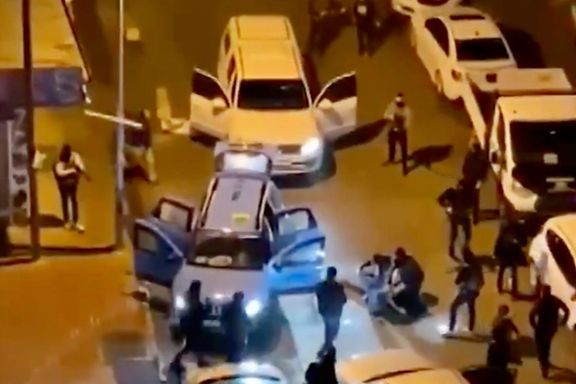
Ankara has announced it arrested an Iranian agent and seven Turks Sept. 24 over an alleged plot to abduct an ex-Iranian military official and render him to Iran.
Turkey's official news agency Anadolu (Anatolia) reportedthat the country's National Intelligence Organization (MIT) and police had made the arrests in Van, a city in south-east Turkey 100km, or an hour’s drive, from the Iranian border.
Anadolu said the spying network had offered the military official's wife $10,000 to help nab her husband − who it identified only by the initials, M. A. − and threatened that her family in Iran would be harmed if she did not cooperate.
Turkish intelligence and police had caught two of the spies, an Iranian identified as S.S. and a Turkish citizen identified as M.E.A.,"red-handed" while attempting to enter the victim's residence, Anadolu said. Six other Turkish nationals were later detained, the agency continued, with MIT suggesting the network had a budget of $30,000 for the operation.
Iranian officials have not commented, even on the arrest of the Iranian.
Iran and Turkey had bilateral trade in 2020 of over $4 billion despite a fall with the coronavirus pandemic but relations have soured recently over Turkey's close ally Azerbaijan's arrest of two Iranian truck drivers and its restriction of Iranian access to Armenia along roads captured from Armenian forces last year.
Baku freed the drivers Wednesday a day after Iranian foreign minister Hossein Amir-Abdollahian spoke by phone with his Azerbaijani counterpart, Jeyhun Bayramov. But tensions linger over recent Turkey-Azerbaijan-Pakistan military drills on one side of the border, with Iranian maneuvers on the other.
Tehran was alarmed at reports last year that Turkey brought in armed Sunni militants from Syria to fight alongside Azerbaijani troops against Armenia and remains concerned at Baku’s relationship with Israel.
Turkey in February arrested a staff member of Iran's consulate in Istanbul, Mohammad-Reza Naserzadeh, in connection with the killing of former Iranian defense official Masoud Molavi-Vardanjani in Istanbul in November 2019.
Naserzadeh was accused of forging travel documents for another Iranian, Ali Esfanjani, the alleged mastermind of the assassination, and helping him flee to Iran three days after Molavi-Vardanjani was shot dead. After Iranian officials denied that any diplomatic staff had been arrested, Anadolu aired footage from Istanbul airport it said showed Naserzadeh's arrest.
Molavi-Vardanjani had launched a Telegram social media channel, Black Box, after fleeing to Turkey in 2018, that made allegations of corruption against Iran’s extraterritorial Qods Force, judges, and other senior figures.
Ankara said in December 2020, when relations with Iran were tense just after the Nagorno-Karabakh war between Azerbaijan and Armenia, that it had arrested 13 led by an Iranian. Turkish intelligence alleged the group had in October assisted Iranian agents to abduct Habib Asyud or Chaab, former head of the Arab Struggle Movement for the Liberation of Ahwaz (ASMLA).
Iran confirmed in November that it had captured Asyud, an advocate of an independent Arab state in Iran’s south-west Khuzestan province. Tehran classifies the ASMLA as a ‘terrorist’ organization.
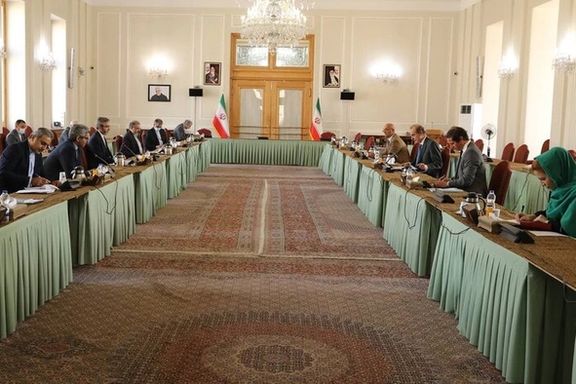
Enrique Mora, European Union’s lead negotiator on Iran’s nuclear issue met with Ali Bagheri, political deputy of Iran’s foreign ministry in Tehran, on Thursday.
Mora’s trip announced earlier this week is meant to break a deadlock in the Vienna nuclear negotiation between Iran and world power that was suspended by Tehran in June. Despite calls by Western powers for the resumption of the talks, Iran has not committed to a clear date for returning to Vienna.
Iranian media reported that the two sides discussed “bilateral and regional issues”, including Afghanistan and the lifting of "cruel sanctions" imposed by the United States after former president Donald Trump withdrew from the 2015 nuclear agreement.
There is no news yet if there was an agreement over resuming the nuclear talks.
On Wednesday, US Secretary of State Antony Blinken and his British, French and German counterparts made statements that Mora’s trip is critical, and Iran must return to the talks. Blinken reiterated that the United States has to consider “other options” if Iran refuses to return to the nuclear agreement (JCPOA) and continues to advance its nuclear program.
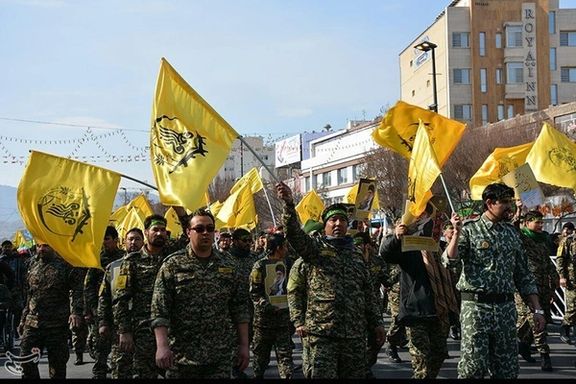
Iran-backed forces in Syria said on Thursday they would respond forcefully to an Israeli strike on Wednesday evening in the second such strike within a week.
The Syrian defense ministry said in a statement that one soldier was killed in the attack that took place at 11:34 p.m. (2034 GMT) and targeted a communications tower and caused some material losses near Palmyra.
Israel has kept silent about the strikes that came days after another attack in the Homs countryside, wounded six Syrian soldiers.
Israel since 2017 has been mounting attacks on what it has described as Iranian-linked targets in Syria, where Tehran-backed forces including Lebanon's Hezbollah have put down a presence since deploying to help President Bashar al-Assad in the Syrian conflict that erupted in 2011.
A statement by the so-called operations room of Assad's Iran-backed allies said the response to the strike would be "very cruel", adding casualties would have been much higher had its forces not been well spread across the desert area.
"As a result of this attack a number of martyrs and injured from our Mujahedeen brothers have fallen," the statement said without elaborating.
"We have taken a decision to respond to this attack in revenge for the martyrs and the blood of the injured and the response will be very cruel," said the statement.
A senior military source who requested anonymity said the strikes hit among other targets the T4 air base where Iran-backed militias launched drone strikes in recent months against US bases in northern Syria.
The Palmyra area where the strikes were conducted are close to a major concentration of Russian bases and where its troops conducted in recent days maneuvers with Syrian troops, military experts say.
Israel wants Iranian and Iran-backed forces kept away from its border and more broadly, removed from Syria entirely.
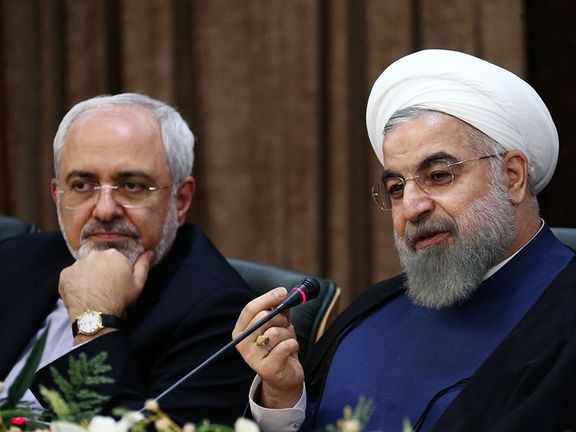
Iran's hardliners appear to be zeroing in on former President Hassan Rouhani and his officials in a bid to blame them for the country's long-standing problems.
Former foreign Minister Mohammad Javad Zarif and Rouhani’s Communication and ICT Minister Mohammad Javad Azari Jahromi are also targets for hardliners who want to find scapegoats for the country's economic, foreign policy and social problems.
The attempt to put Rouhani and his ministers on trial, as the Majles has been calling it, could also be a cover to divert attention from Supreme Leader Ali Khamenei who is the man making nearly all decisions relating to the affairs of the state without assuming responsibility when his policies go wrong.
Iran has faced various degrees of isolation during Khamenei’s 32-year rule and has faced sanctions because of his policies opposing the United States, Israel and the West in general.
On October 7, Mohammad Hossein Asafari, the deputy chairman of the Iranian parliament's Interior Affairs Committee called for putting Rouhani and Zarif on trial and blamed them for the failure in nuclear negotiations in Vienna to revive the 2015 nuclear deal with world powers.
Asafari even accused Zarif of signing the deal also called the JCPOA (Joint Comprehensive Plan of Action) without having read it first. He said the Rouhani administration should have sought guarantees from the US to stand by its promises under the JCPOA.
Despite denials by Zarif, Asafari charged that Zarif has allegedly "confessed" that he did not know about the terms of the deal. He said: "All the evidence available indicate that the failure of the talks is due to the negligence of the negotiating team led by Zarif."
Subsequently, another influential lawmaker told the media that a legal case has been made against Zarif and Rouhani. Hassan Shojaee said that the committee has received a petition signed by more than 500,000 individuals who demanded Rouhani's trial.
According to Shojaee, the charges against Rouhani include, "not doing anything about rising [foreign currency] rates, devaluation of national currency and destruction of people's assets, giving key jobs to spies and dual nationals, and failing to tackle the rising death toll as the coronavirus pandemic raged on." Rouhani is being blamed for the pandemic toll, while it was Khamenei who banned the purchase of American and British vaccines in January.
Reformist daily Sharq has described the initiatives taken by the Majles against Rouhani and his ministers as an attempt to settle scores now when he is out of power and unable to respond to charges like before. Sharq said the hardliners treat Rouhani in a way as if mudslinging is their only solution in the face of the country's problems.
In another development, the Iranian Judiciary has announced that former Communication and ITC minister Jahromi is free on bail and might be called to court to stand trial or even go to jail. He has been a target for hardliners who accuse him of not pursuing more internet censorship, specially blocking popular social media apps.
Recently, Jahromi once again opposed parliament's plan to ban or radically restrict all social media, while hardliner lawmakers, including former ultraconservative Paydari Party leader Morteza Agha Tehrani, said that they would further the plan even all 80 million Iranians oppose it.
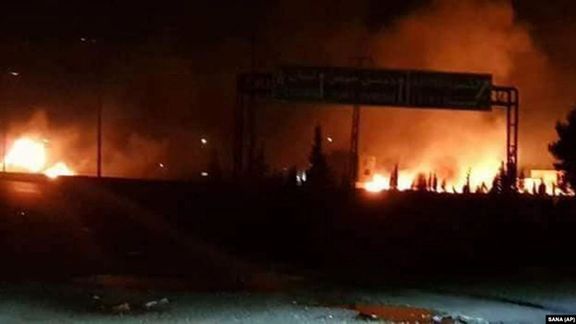
A Syrian airbase reportedly housing Iran-affiliated forces came under air attack just before midnight on Wednesday by what observers say were Israeli planes.
The official Syrian news agency SANA said one Syrian soldier was killed and three wounded in attack. The T4 airbase is located near the city of Palmyra.
The Syrian Observatory for Human Rights, a UK-based war monitor, said the airstrike hit targets controlled by Iranian forces, including the communication tower at the airport. The monitoring group said one Syrian soldier and three Iran-backed fighters were killed and seven others, among them three Syrian soldiers wounded.
It did not identify the nationality of the non-Syrian fighters.
Fars news agency in Iran, affiliated with the Revolutionary Guard (IRGC), reported the attack quoting the Syrian news agency without referring to any Iranian presence in the airport.
Since 2017, Israel has intensified air attacks against Iran-affiliated forces in Syria with hundreds of strikes so far. It rarely acknowledges the attacks but always maintains that it will not allow the Iranian military to entrench itself in Syria and pose a threat to Israel.